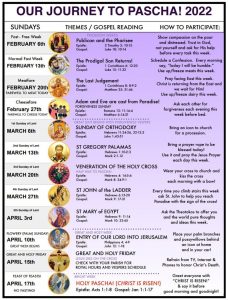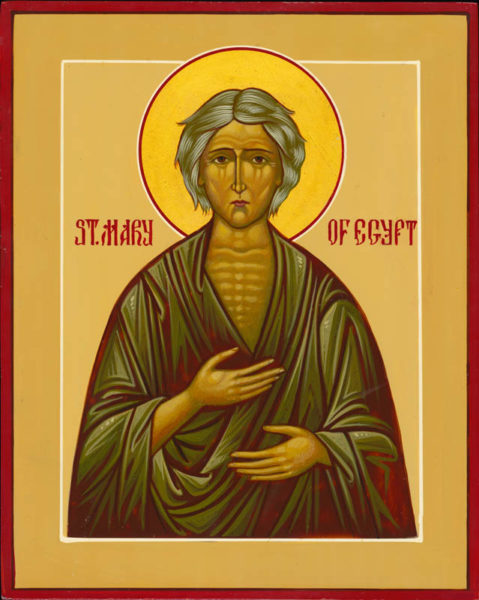
Category: Great Fast-Lent
Sunday of the Holy Cross resources
When, then, you make the sign of the cross on the forehead, arm yourself with a saintly boldness, and reinstall your soul in its old liberty; for you are not ignorant that the cross is a prize beyond all price.
Consider what is the price given for your ransom, and you will never more be slave to any man on earth. This reward and ransom is the cross. You should not then, carelessly make the sign on the forehead, but you should impress it on your heart with the love of a fervent faith. Nothing impure will dare to disturb you on seeing the weapon, which overcomes all things. (St. John Chrysostom)
As we approach the Sunday of the Veneration of the Holy Cross, let us consider also how we reverence the cross in our day to day life. Do I make the Sign of the Cross impressed on my heart with fervent faith?
Here are the Biblical, liturgical and catechetical resources for this Sunday given to us from God With Us Online. Be sure to both the Troparion in the Ukrainian tone and the Gospel reflection.
Liturgy of the Pre-sanctified TONIGHT
TONIGHT at 7pm we will have the Lenten service, the Liturgy of the Pre-sanctified. It is an ancient service attributed to Pope St. Gregory the Great.
Please join us in prayer.
Sorokousty– All Souls’ Saturdays 2021
![]() During the Great Lent there are special services held for the deceased members of a parish. These requiem services, known as “Sorokousty”, involves the reading of the individual names of deceased family members of parishioners.
During the Great Lent there are special services held for the deceased members of a parish. These requiem services, known as “Sorokousty”, involves the reading of the individual names of deceased family members of parishioners.
Kindly provide Father Iura with the names of your deceased loved ones whom you wish to have remembered in our prayers.
Sorokousty will be celebrated on All Souls’ Saturdays: February 6th, February 27th , March 6th, March 13th, and May 22nd . Please take your book found in the entrance of the church, fill it out, place it in envelope, and drop it in the collection basket.
If you need a new book, ask Father Iura.
Lenten Service on Friday
Great and Holy Week Schedule 2019
Great Wednesday, 4/17
7:00 p.m. Divine Liturgy of the Pre-sanctified Gifts
Great Thursday, 4/18
7:00 p.m. Great Matins and the Proclamation of the Passion Gospels
Great Friday, 4/19 —a day of strict fast and abstinence –NO meat or dairy products
4:00 p.m. Great Vespers with the Laying Out and Veneration of the Holy Shroud
Great Saturday, 4/20
8:00 a.m. Divine Liturgy
4:00 p.m. Blessing of Easter Foods
6:00 p.m. Blessing of Easter Foods
7:00 p.m. Great Vespers and Prayers at the Tomb
Sunday, 4/21, Resurrection of Our Lord God and Savior, Jesus Christ
9:00 a.m. Procession and Pascal Matins
10:30 a.m. For the people of the parish
Blessing of Artos
Blessing of Easter Foods
5th Sunday of the Fast – St Mary of Egypt
 This Sunday of the breathtaking life of Saint Mary of Egypt is commemorated and presented to us sinners as an example of heroic hope in the mercy of the Lord and the heights it can raise us to.
This Sunday of the breathtaking life of Saint Mary of Egypt is commemorated and presented to us sinners as an example of heroic hope in the mercy of the Lord and the heights it can raise us to.
The boundlessly sinful woman who took all in lust now boundlessly gives herself to Love. Our unity with Christ is a wedding that gives life, rather than take away. She exemplifies the beauty of Catholic sexuality, and in that light sheds even greater light on the “no-no’s” of the Church that everyone in their worldly thinking sees as discrimination. We don’t look at the No’s as if they were the meaning of our life. We don’t look at what we must not do but what we should be doing and always in better ways! Fear of death is an imperfect way of avoiding sin (just as in Confession’s contrition). It is LOVE that must draw us to God, and naturally this means away from any disfigurement (sin) of His Image in us and the beauty of His works.
Saint Mary reflects the harrowing difference between a sterile taking away of someone else’s treasure for our pleasure (her previous life) vs. the fertile and life-giving love that draws us out of ourselves to give this self to another as the height of our Matrimonial unity. The Catechism of the Catholic Church speaks of Matrimony’s purpose as being two things: to get yourself and the other to Heaven, and participating in God’s creating act by making souls for Heaven. It doesn’t talk about “he’s handsome and I get butterflies” or “she’s pretty and I like her”. These are natural feelings and beautiful in the right place. However, to follow them as the primary source and goal of our sexual love is a blasphemy against the Sacrament of Matrimony and our Crowning as mutual martyrs for the sake of Love. It is like saying “I am not a Christian, I see the Eucharist, I don’t think about God but I receive Him because the Host tastes good.” What a blasphemy and a sorrowful misunderstanding of the treasure unfolding in the Sacrament!
Saint Mary of Egypt who had known the entirety of worldly pleasures and a sexuality given to lust, finally in one moment of Grace understood that the true Love everyone is called to have and experience is the One hanging on the Cross. She represents a soul that crucifies itself and all the worldliness within it to be raised in Christ from the tomb of sin. And the means for this is always the Cross. A soul that crucifies its plans and picture-perfect future to raise that “unplanned” life growing in her womb. A soul that crucifies its pride and false expectations of what it “deserves” in order to refrain from insulting but rather raising the other. A soul that crucifies its pleasure and rest to stick with its family and maintain a tiresome job to raise the kids. So on…
Presanctified Liturgy TONIGHT
Today, Friday, March 29, at 7:00 p.m. Father Iura will serve the Divine Liturgy of the Presanctified Gifts, in English and Ukrainian.
This is our weekly Lenten devotion. Join us in prayer and the reception of the Eucharist. Bring a friend.
On Fasting by St. John Chrysostom
The value of fasting consists not in abstinence only from food, but in a renouncing of sinful practices. Do you fast? Give me proof of it by your works. If you see a poor man, take pity on him! If you see a friend being honored, do not envy him. Do not let only your mouth fast, but also the eye and the ear and the feet and the hands and all members of your bodies. Let the hands fast, by being free from greed. Let the feet fast, by ceasing to run after sin. Let the eyes fast, by observing modesty and disciplining them not to glare at that which is sinful. For it would be an instance of the highest ridiculousness to abstain from meats and unlawful food because of the fast, but with the eyes to feed on what is forbidden. Let the ear fast, by not listening to evil talk and gossip. Let the mouth fast from foul words and unjust criticism. For what good is it if we abstain from birds and fish, and yet bite and devour our brothers?
St. John Chrysostom
Recipes for the Great Fast
Here are some recipes for the Great Fast/Lent from the monks of Mount Athos
Let us know how the recipes come out…